Knowledge Management: The Role of Social Media and Analytics
VerifiedAdded on 2023/05/31
|6
|1384
|341
Essay
AI Summary
This essay provides an overview of knowledge management, emphasizing the role of social media analytics and the techno-centric theory in enhancing organizational knowledge. It reviews literature highlighting the importance of effective knowledge management for competitive advantage, particularly through leveraging data from social media platforms. The essay also addresses the gap in the techno-centric theory regarding customer subscription to technology enablers and suggests rewarding customers for utilizing social media platforms to promote loyalty and improve the effectiveness of social media analytics in knowledge management. The conclusion emphasizes the continuous development of knowledge management with the growth of social media technologies and its role in solving business challenges.
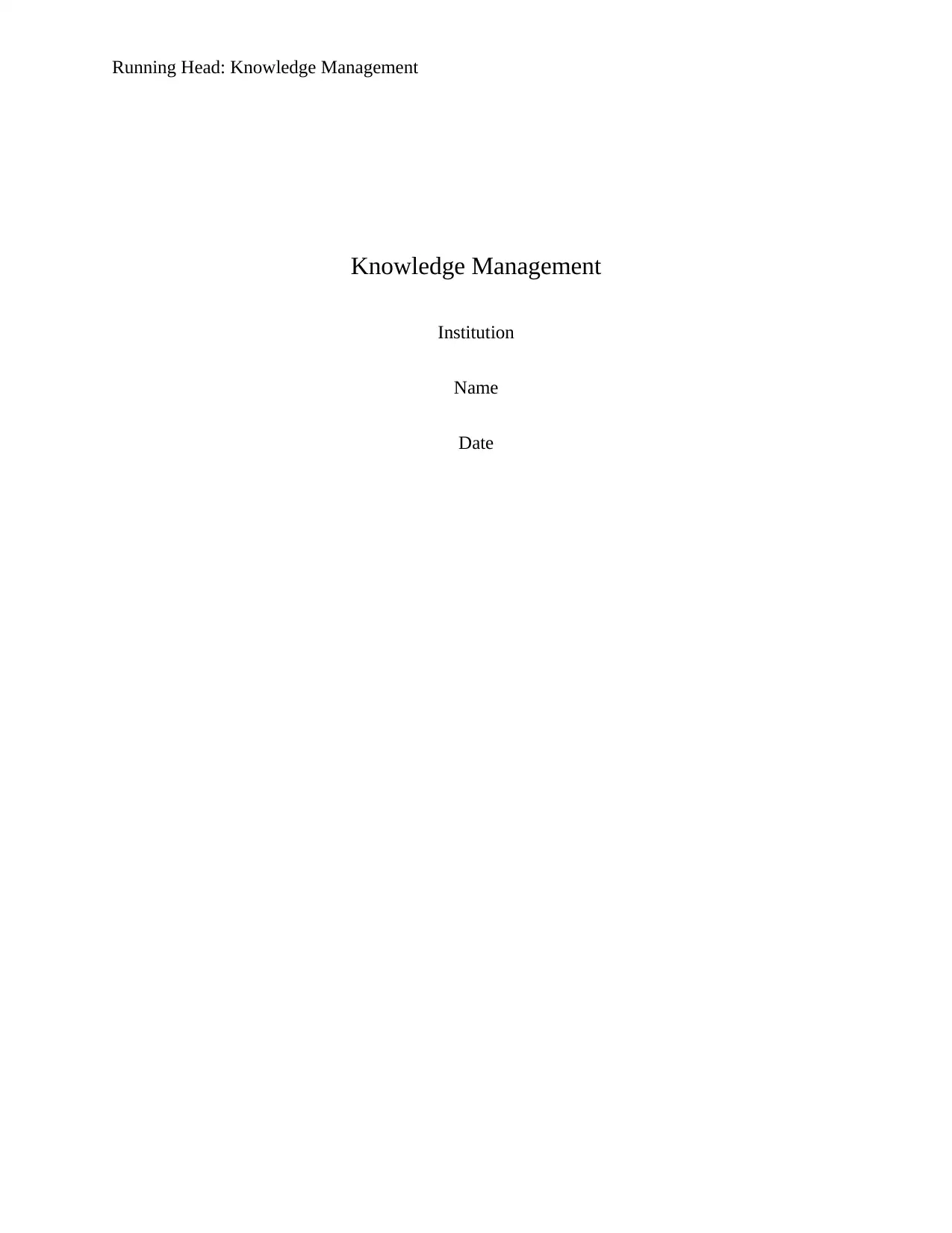
Running Head: Knowledge Management
Knowledge Management
Institution
Name
Date
Knowledge Management
Institution
Name
Date
Paraphrase This Document
Need a fresh take? Get an instant paraphrase of this document with our AI Paraphraser
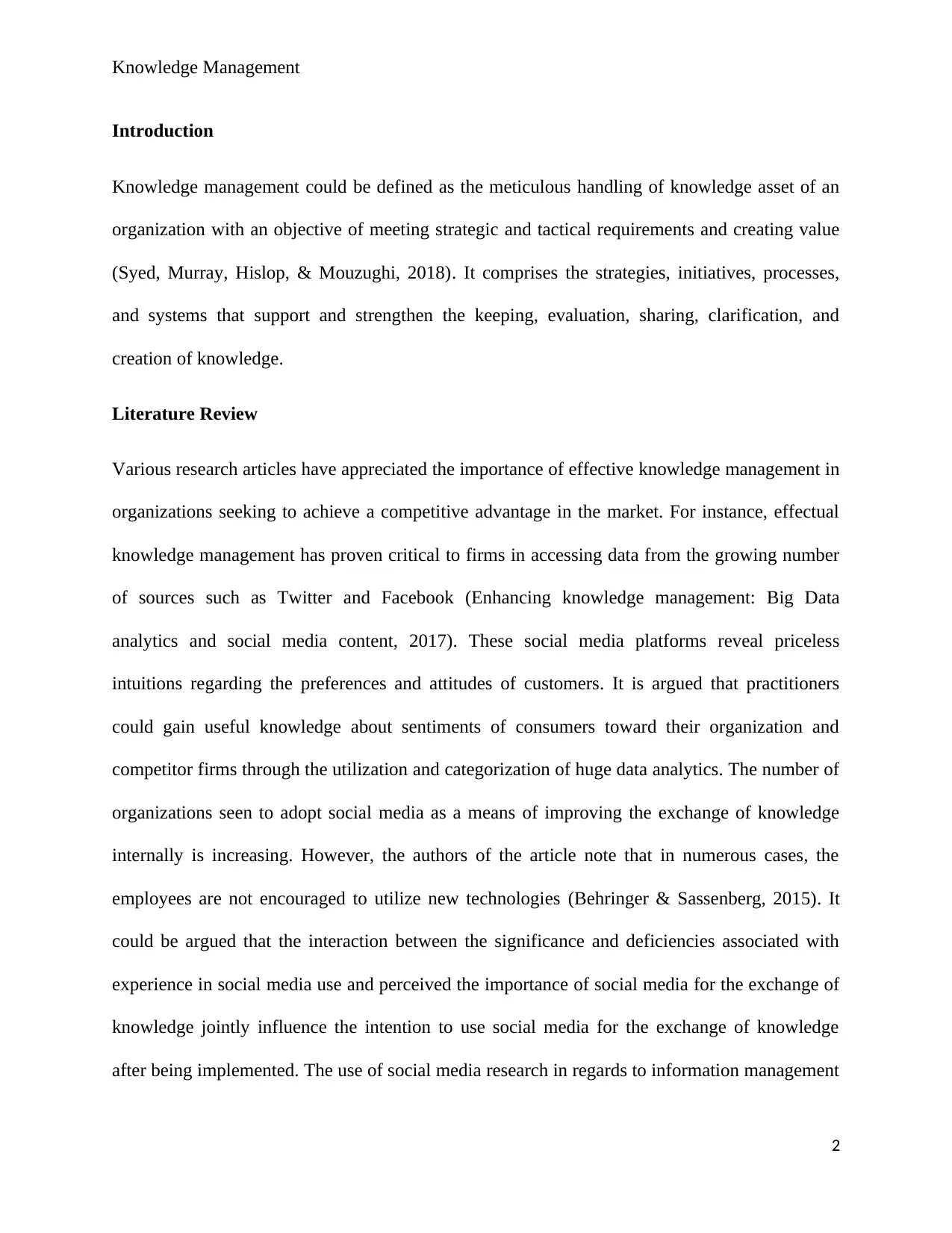
Knowledge Management
Introduction
Knowledge management could be defined as the meticulous handling of knowledge asset of an
organization with an objective of meeting strategic and tactical requirements and creating value
(Syed, Murray, Hislop, & Mouzughi, 2018). It comprises the strategies, initiatives, processes,
and systems that support and strengthen the keeping, evaluation, sharing, clarification, and
creation of knowledge.
Literature Review
Various research articles have appreciated the importance of effective knowledge management in
organizations seeking to achieve a competitive advantage in the market. For instance, effectual
knowledge management has proven critical to firms in accessing data from the growing number
of sources such as Twitter and Facebook (Enhancing knowledge management: Big Data
analytics and social media content, 2017). These social media platforms reveal priceless
intuitions regarding the preferences and attitudes of customers. It is argued that practitioners
could gain useful knowledge about sentiments of consumers toward their organization and
competitor firms through the utilization and categorization of huge data analytics. The number of
organizations seen to adopt social media as a means of improving the exchange of knowledge
internally is increasing. However, the authors of the article note that in numerous cases, the
employees are not encouraged to utilize new technologies (Behringer & Sassenberg, 2015). It
could be argued that the interaction between the significance and deficiencies associated with
experience in social media use and perceived the importance of social media for the exchange of
knowledge jointly influence the intention to use social media for the exchange of knowledge
after being implemented. The use of social media research in regards to information management
2
Introduction
Knowledge management could be defined as the meticulous handling of knowledge asset of an
organization with an objective of meeting strategic and tactical requirements and creating value
(Syed, Murray, Hislop, & Mouzughi, 2018). It comprises the strategies, initiatives, processes,
and systems that support and strengthen the keeping, evaluation, sharing, clarification, and
creation of knowledge.
Literature Review
Various research articles have appreciated the importance of effective knowledge management in
organizations seeking to achieve a competitive advantage in the market. For instance, effectual
knowledge management has proven critical to firms in accessing data from the growing number
of sources such as Twitter and Facebook (Enhancing knowledge management: Big Data
analytics and social media content, 2017). These social media platforms reveal priceless
intuitions regarding the preferences and attitudes of customers. It is argued that practitioners
could gain useful knowledge about sentiments of consumers toward their organization and
competitor firms through the utilization and categorization of huge data analytics. The number of
organizations seen to adopt social media as a means of improving the exchange of knowledge
internally is increasing. However, the authors of the article note that in numerous cases, the
employees are not encouraged to utilize new technologies (Behringer & Sassenberg, 2015). It
could be argued that the interaction between the significance and deficiencies associated with
experience in social media use and perceived the importance of social media for the exchange of
knowledge jointly influence the intention to use social media for the exchange of knowledge
after being implemented. The use of social media research in regards to information management
2
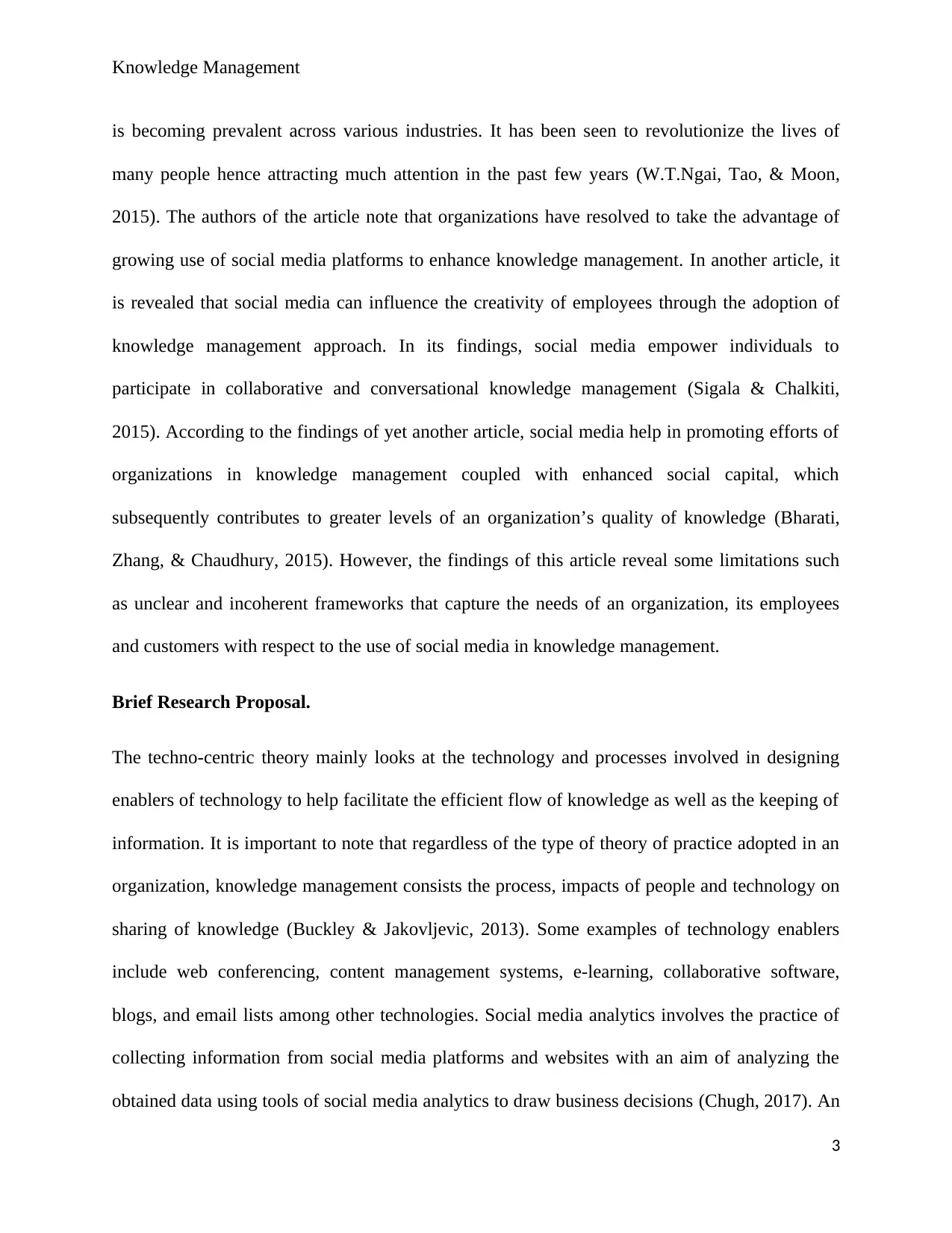
Knowledge Management
is becoming prevalent across various industries. It has been seen to revolutionize the lives of
many people hence attracting much attention in the past few years (W.T.Ngai, Tao, & Moon,
2015). The authors of the article note that organizations have resolved to take the advantage of
growing use of social media platforms to enhance knowledge management. In another article, it
is revealed that social media can influence the creativity of employees through the adoption of
knowledge management approach. In its findings, social media empower individuals to
participate in collaborative and conversational knowledge management (Sigala & Chalkiti,
2015). According to the findings of yet another article, social media help in promoting efforts of
organizations in knowledge management coupled with enhanced social capital, which
subsequently contributes to greater levels of an organization’s quality of knowledge (Bharati,
Zhang, & Chaudhury, 2015). However, the findings of this article reveal some limitations such
as unclear and incoherent frameworks that capture the needs of an organization, its employees
and customers with respect to the use of social media in knowledge management.
Brief Research Proposal.
The techno-centric theory mainly looks at the technology and processes involved in designing
enablers of technology to help facilitate the efficient flow of knowledge as well as the keeping of
information. It is important to note that regardless of the type of theory of practice adopted in an
organization, knowledge management consists the process, impacts of people and technology on
sharing of knowledge (Buckley & Jakovljevic, 2013). Some examples of technology enablers
include web conferencing, content management systems, e-learning, collaborative software,
blogs, and email lists among other technologies. Social media analytics involves the practice of
collecting information from social media platforms and websites with an aim of analyzing the
obtained data using tools of social media analytics to draw business decisions (Chugh, 2017). An
3
is becoming prevalent across various industries. It has been seen to revolutionize the lives of
many people hence attracting much attention in the past few years (W.T.Ngai, Tao, & Moon,
2015). The authors of the article note that organizations have resolved to take the advantage of
growing use of social media platforms to enhance knowledge management. In another article, it
is revealed that social media can influence the creativity of employees through the adoption of
knowledge management approach. In its findings, social media empower individuals to
participate in collaborative and conversational knowledge management (Sigala & Chalkiti,
2015). According to the findings of yet another article, social media help in promoting efforts of
organizations in knowledge management coupled with enhanced social capital, which
subsequently contributes to greater levels of an organization’s quality of knowledge (Bharati,
Zhang, & Chaudhury, 2015). However, the findings of this article reveal some limitations such
as unclear and incoherent frameworks that capture the needs of an organization, its employees
and customers with respect to the use of social media in knowledge management.
Brief Research Proposal.
The techno-centric theory mainly looks at the technology and processes involved in designing
enablers of technology to help facilitate the efficient flow of knowledge as well as the keeping of
information. It is important to note that regardless of the type of theory of practice adopted in an
organization, knowledge management consists the process, impacts of people and technology on
sharing of knowledge (Buckley & Jakovljevic, 2013). Some examples of technology enablers
include web conferencing, content management systems, e-learning, collaborative software,
blogs, and email lists among other technologies. Social media analytics involves the practice of
collecting information from social media platforms and websites with an aim of analyzing the
obtained data using tools of social media analytics to draw business decisions (Chugh, 2017). An
3
⊘ This is a preview!⊘
Do you want full access?
Subscribe today to unlock all pages.

Trusted by 1+ million students worldwide
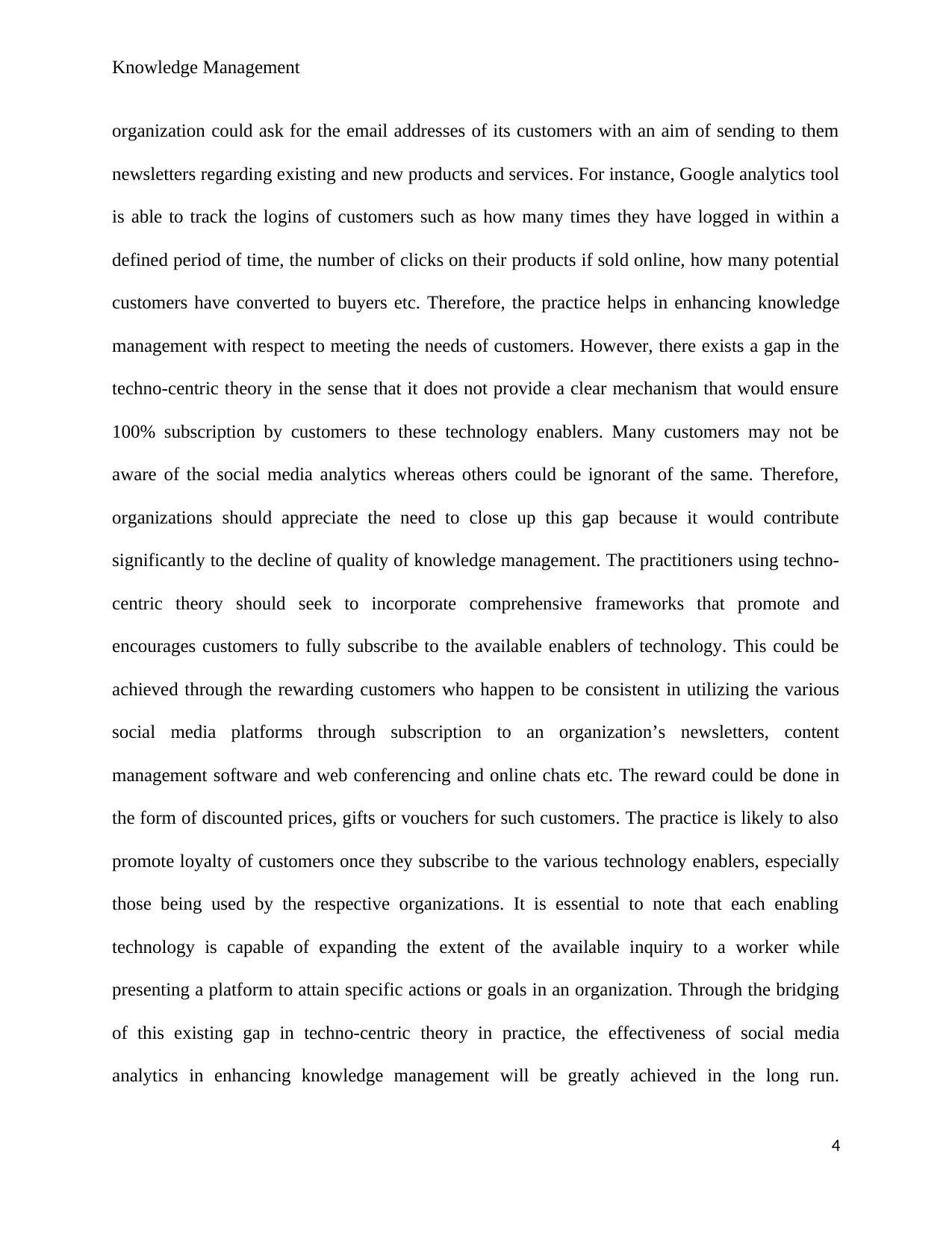
Knowledge Management
organization could ask for the email addresses of its customers with an aim of sending to them
newsletters regarding existing and new products and services. For instance, Google analytics tool
is able to track the logins of customers such as how many times they have logged in within a
defined period of time, the number of clicks on their products if sold online, how many potential
customers have converted to buyers etc. Therefore, the practice helps in enhancing knowledge
management with respect to meeting the needs of customers. However, there exists a gap in the
techno-centric theory in the sense that it does not provide a clear mechanism that would ensure
100% subscription by customers to these technology enablers. Many customers may not be
aware of the social media analytics whereas others could be ignorant of the same. Therefore,
organizations should appreciate the need to close up this gap because it would contribute
significantly to the decline of quality of knowledge management. The practitioners using techno-
centric theory should seek to incorporate comprehensive frameworks that promote and
encourages customers to fully subscribe to the available enablers of technology. This could be
achieved through the rewarding customers who happen to be consistent in utilizing the various
social media platforms through subscription to an organization’s newsletters, content
management software and web conferencing and online chats etc. The reward could be done in
the form of discounted prices, gifts or vouchers for such customers. The practice is likely to also
promote loyalty of customers once they subscribe to the various technology enablers, especially
those being used by the respective organizations. It is essential to note that each enabling
technology is capable of expanding the extent of the available inquiry to a worker while
presenting a platform to attain specific actions or goals in an organization. Through the bridging
of this existing gap in techno-centric theory in practice, the effectiveness of social media
analytics in enhancing knowledge management will be greatly achieved in the long run.
4
organization could ask for the email addresses of its customers with an aim of sending to them
newsletters regarding existing and new products and services. For instance, Google analytics tool
is able to track the logins of customers such as how many times they have logged in within a
defined period of time, the number of clicks on their products if sold online, how many potential
customers have converted to buyers etc. Therefore, the practice helps in enhancing knowledge
management with respect to meeting the needs of customers. However, there exists a gap in the
techno-centric theory in the sense that it does not provide a clear mechanism that would ensure
100% subscription by customers to these technology enablers. Many customers may not be
aware of the social media analytics whereas others could be ignorant of the same. Therefore,
organizations should appreciate the need to close up this gap because it would contribute
significantly to the decline of quality of knowledge management. The practitioners using techno-
centric theory should seek to incorporate comprehensive frameworks that promote and
encourages customers to fully subscribe to the available enablers of technology. This could be
achieved through the rewarding customers who happen to be consistent in utilizing the various
social media platforms through subscription to an organization’s newsletters, content
management software and web conferencing and online chats etc. The reward could be done in
the form of discounted prices, gifts or vouchers for such customers. The practice is likely to also
promote loyalty of customers once they subscribe to the various technology enablers, especially
those being used by the respective organizations. It is essential to note that each enabling
technology is capable of expanding the extent of the available inquiry to a worker while
presenting a platform to attain specific actions or goals in an organization. Through the bridging
of this existing gap in techno-centric theory in practice, the effectiveness of social media
analytics in enhancing knowledge management will be greatly achieved in the long run.
4
Paraphrase This Document
Need a fresh take? Get an instant paraphrase of this document with our AI Paraphraser
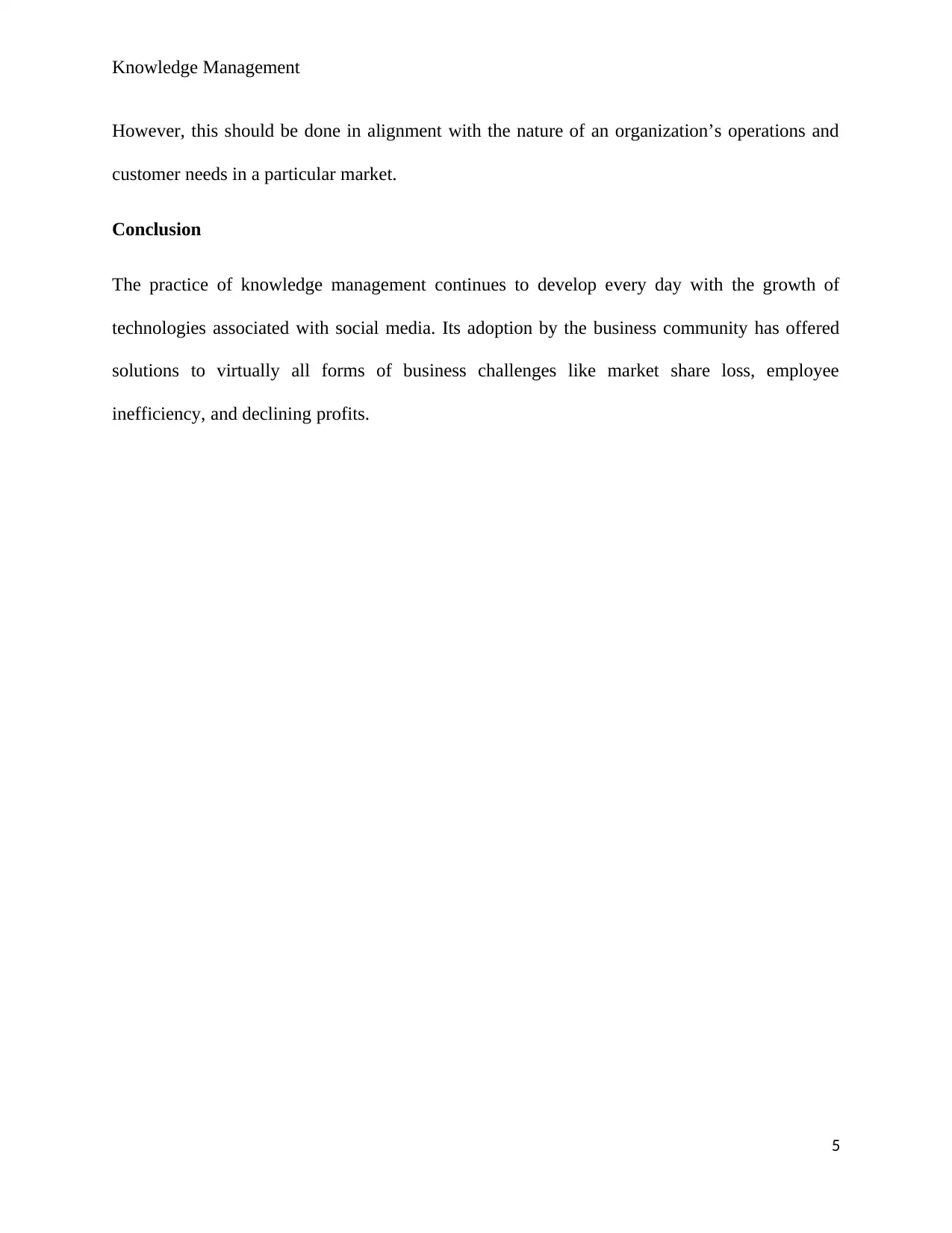
Knowledge Management
However, this should be done in alignment with the nature of an organization’s operations and
customer needs in a particular market.
Conclusion
The practice of knowledge management continues to develop every day with the growth of
technologies associated with social media. Its adoption by the business community has offered
solutions to virtually all forms of business challenges like market share loss, employee
inefficiency, and declining profits.
5
However, this should be done in alignment with the nature of an organization’s operations and
customer needs in a particular market.
Conclusion
The practice of knowledge management continues to develop every day with the growth of
technologies associated with social media. Its adoption by the business community has offered
solutions to virtually all forms of business challenges like market share loss, employee
inefficiency, and declining profits.
5
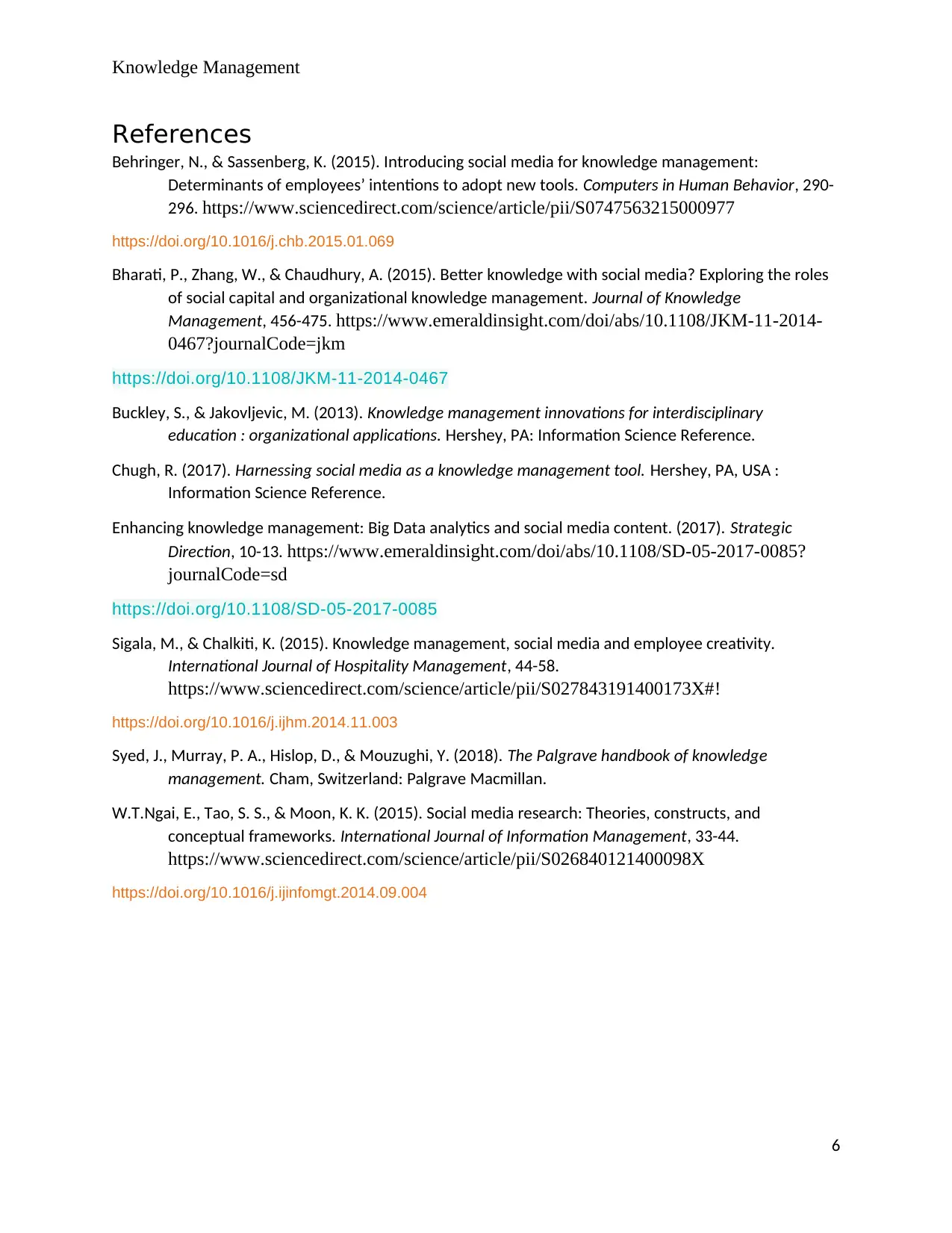
Knowledge Management
References
Behringer, N., & Sassenberg, K. (2015). Introducing social media for knowledge management:
Determinants of employees’ intentions to adopt new tools. Computers in Human Behavior, 290-
296. https://www.sciencedirect.com/science/article/pii/S0747563215000977
https://doi.org/10.1016/j.chb.2015.01.069
Bharati, P., Zhang, W., & Chaudhury, A. (2015). Better knowledge with social media? Exploring the roles
of social capital and organizational knowledge management. Journal of Knowledge
Management, 456-475. https://www.emeraldinsight.com/doi/abs/10.1108/JKM-11-2014-
0467?journalCode=jkm
https://doi.org/10.1108/JKM-11-2014-0467
Buckley, S., & Jakovljevic, M. (2013). Knowledge management innovations for interdisciplinary
education : organizational applications. Hershey, PA: Information Science Reference.
Chugh, R. (2017). Harnessing social media as a knowledge management tool. Hershey, PA, USA :
Information Science Reference.
Enhancing knowledge management: Big Data analytics and social media content. (2017). Strategic
Direction, 10-13. https://www.emeraldinsight.com/doi/abs/10.1108/SD-05-2017-0085?
journalCode=sd
https://doi.org/10.1108/SD-05-2017-0085
Sigala, M., & Chalkiti, K. (2015). Knowledge management, social media and employee creativity.
International Journal of Hospitality Management, 44-58.
https://www.sciencedirect.com/science/article/pii/S027843191400173X#!
https://doi.org/10.1016/j.ijhm.2014.11.003
Syed, J., Murray, P. A., Hislop, D., & Mouzughi, Y. (2018). The Palgrave handbook of knowledge
management. Cham, Switzerland: Palgrave Macmillan.
W.T.Ngai, E., Tao, S. S., & Moon, K. K. (2015). Social media research: Theories, constructs, and
conceptual frameworks. International Journal of Information Management, 33-44.
https://www.sciencedirect.com/science/article/pii/S026840121400098X
https://doi.org/10.1016/j.ijinfomgt.2014.09.004
6
References
Behringer, N., & Sassenberg, K. (2015). Introducing social media for knowledge management:
Determinants of employees’ intentions to adopt new tools. Computers in Human Behavior, 290-
296. https://www.sciencedirect.com/science/article/pii/S0747563215000977
https://doi.org/10.1016/j.chb.2015.01.069
Bharati, P., Zhang, W., & Chaudhury, A. (2015). Better knowledge with social media? Exploring the roles
of social capital and organizational knowledge management. Journal of Knowledge
Management, 456-475. https://www.emeraldinsight.com/doi/abs/10.1108/JKM-11-2014-
0467?journalCode=jkm
https://doi.org/10.1108/JKM-11-2014-0467
Buckley, S., & Jakovljevic, M. (2013). Knowledge management innovations for interdisciplinary
education : organizational applications. Hershey, PA: Information Science Reference.
Chugh, R. (2017). Harnessing social media as a knowledge management tool. Hershey, PA, USA :
Information Science Reference.
Enhancing knowledge management: Big Data analytics and social media content. (2017). Strategic
Direction, 10-13. https://www.emeraldinsight.com/doi/abs/10.1108/SD-05-2017-0085?
journalCode=sd
https://doi.org/10.1108/SD-05-2017-0085
Sigala, M., & Chalkiti, K. (2015). Knowledge management, social media and employee creativity.
International Journal of Hospitality Management, 44-58.
https://www.sciencedirect.com/science/article/pii/S027843191400173X#!
https://doi.org/10.1016/j.ijhm.2014.11.003
Syed, J., Murray, P. A., Hislop, D., & Mouzughi, Y. (2018). The Palgrave handbook of knowledge
management. Cham, Switzerland: Palgrave Macmillan.
W.T.Ngai, E., Tao, S. S., & Moon, K. K. (2015). Social media research: Theories, constructs, and
conceptual frameworks. International Journal of Information Management, 33-44.
https://www.sciencedirect.com/science/article/pii/S026840121400098X
https://doi.org/10.1016/j.ijinfomgt.2014.09.004
6
⊘ This is a preview!⊘
Do you want full access?
Subscribe today to unlock all pages.

Trusted by 1+ million students worldwide
1 out of 6
Related Documents
Your All-in-One AI-Powered Toolkit for Academic Success.
+13062052269
info@desklib.com
Available 24*7 on WhatsApp / Email
![[object Object]](/_next/static/media/star-bottom.7253800d.svg)
Unlock your academic potential
Copyright © 2020–2026 A2Z Services. All Rights Reserved. Developed and managed by ZUCOL.





